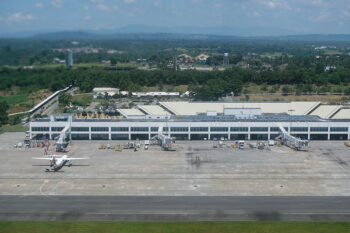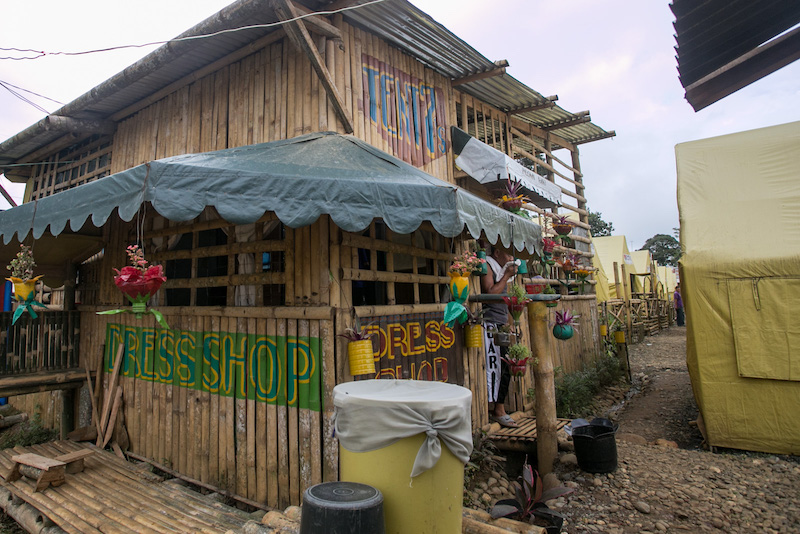 The home of tailor Gamor Dirindigun, of Marawi City stands out in the tent city in Pantar, Lanao del Norte. MANMAN DEJETO
The home of tailor Gamor Dirindigun, of Marawi City stands out in the tent city in Pantar, Lanao del Norte. MANMAN DEJETO
The Siege
The five-month war in Marawi City started with a failed raid to capture the emir of the Islamic State (ISIS) in Southeast Asia, Isnilon Hapilon, leader of the terror group Abu Sayaff.
According to the military, Hapilon joined forces with the Lanao-based Maute Group and planned to attack Marawi City on May 26, the first day of Ramadan. But on May 23, an attempt of a combined military and police operations to arrest Hapilon in an apartment in the village of Basak Malutlut failed, reportedly prompting them to execute their planned attack on that day instead.
The Mautes and Hapilon had earlier pledged their allegiance to the ISIS and had set their sights on establishing Marawi City as a caliphate of the ISIS.
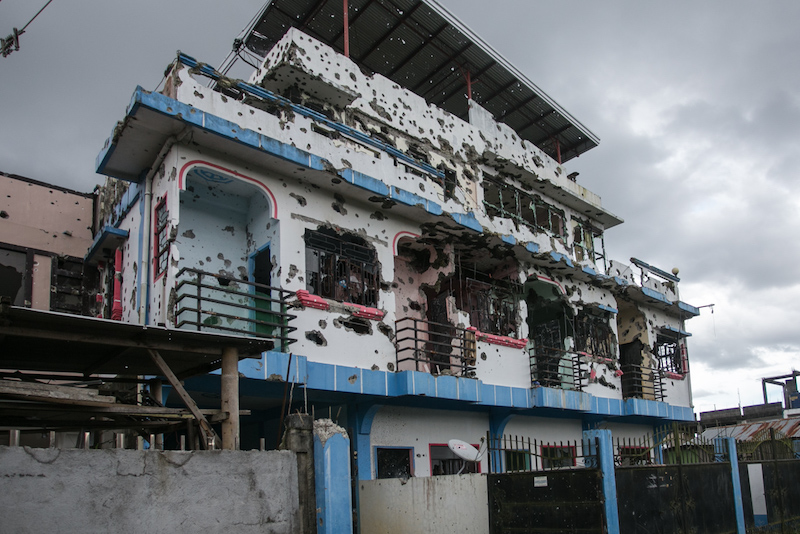 Bullet-ridden apartment where Isnilon Hapilon stayed. The first shots of the 5-month war were fired here. MANMAN DEJETO
Bullet-ridden apartment where Isnilon Hapilon stayed. The first shots of the 5-month war were fired here. MANMAN DEJETO
Clad in black and carrying powerful firearms, hundreds of terrorists ransacked the Dansalan College, Amai Pakpak Medical Center, the Marawi City Jail, and St. Mary’s Cathedral on the first day of their clashes with Philippine government forces.
The fighting quickly escalated as the Maute Group had entrenched hundreds of fighters and were already spread across Marawi City and reinforcements came in. Within a day Marawi residents began to evacuate. Some residents fled on foot, others filled their cars with their belongings, and some braved the strong current of the mighty Agus River just to escape.
‘Bakwit’
At least 90% of the residents of Marawi City fled their homes. The attack on the only Islamic city in the country was unprecedented even neighboring towns and municipalities in Lanao del Sur had to flee. A total of 77,170 famililes or 353, 636 individuals were displaced.
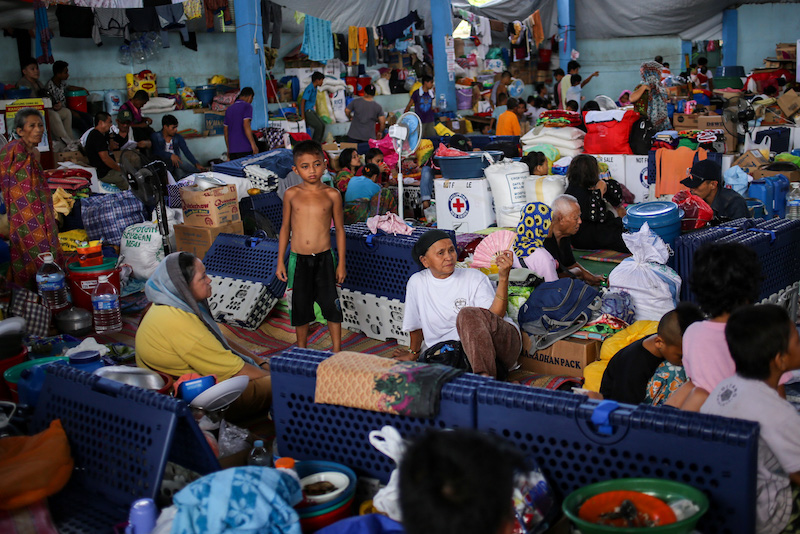 Heat, noise and congestion. Daily inconveniences experienced by ‘bakwits.’. MANMAN DEJETO
Heat, noise and congestion. Daily inconveniences experienced by ‘bakwits.’. MANMAN DEJETO
Towns north of Marawi received the bulk of those who had fled the fighting. Gymnasiums and schools in Lanao del Norte and Iligan Cty were hurriedly converted into evacuation centers. Others stayed with their relatives to wait for the fighting to stop.
Tent cities were soon put up in the towns of Saguiaran in Lanao del Sur and Lanao del Norte towns of Balo-i and Pantar. Evacuation centers had to be decongested to prevent the spread of disease and to ease the living conditions of the displaced.
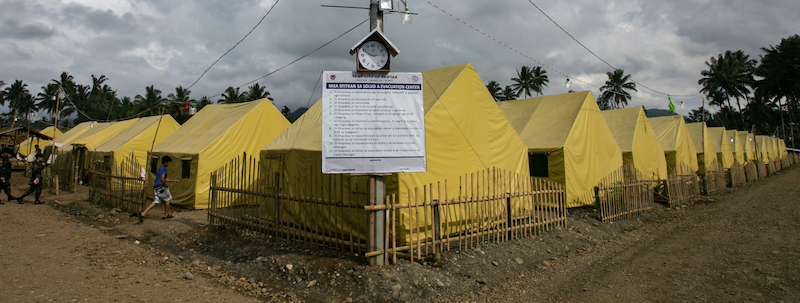 Tent City in Pantar, Lanao del Norte. MANMAN DEJETO
Tent City in Pantar, Lanao del Norte. MANMAN DEJETO
One of the camps housing displaced Marawi City residents is the tent city of Pantar, its yellow tents brightly punctuating a cornfield. A hundred and nine families live in Pantar while they waited out the end of fighting in Marawi.
While each family is lucky to have a tent each, they have to rely on water deliveries for their potable water. For their medical needs, they have to travel 30 kilometers to Iligan City to avail of government-subsidized care. The advantage of Pantar lies on its proximity to schools.
Pantar’s tent city is across a primary school and down the road from a national high school. However, not all children from Marawi were accommodated to continue their studies in Pantar.
Among those fortunate to be enrolled in Pantar’s schools are the children of Gamor Dirindigun. Gamor chose to move out of his relative’s place and live in the tent city so he can continue to send his children to school.
Gamor and his wife, Ribisalam, ran a dress shop out of their home in Marawi City. They had a modest business with seven sewing machines plus a zigzagger, a specialized sewing machine used to stitch the edge of cloth to prevent fraying. Their dress shop is situated between the two main access bridge of Mapandi and Banggolo that lead to downtown Marawi.
They left Marawi City on a tricycle with nothing but the clothes they were wearing. They had spent a fortune a few days before to buy a new washing machine, a refrigerator, and an oven to welcome the start of the holy month of Ramadan.
Gamor’s family relied on relief packs distributed by aid organizations and the social welfare department of the government for two months before they were able to transfer to the tent city. As the war dragged on, the aid became less frequent.
Gamor knew he had to find a way to earn money to support his family.
One day, teachers who were frequent customers of Gamor’s dress shop in Marawi saw him on the streets of Pantar. Learning that he had lost his home and business to the war, one of the teachers offered to lend Gamor a sewing machine she had at home.
“Kinamusta nila kami, kung may nadala ba kami sa mga makina namin. Sabi ko wala, wala talaga. Kaya voluntarily pinahiram ang isang makina ng teacher.” (“They asked us how we are, if we were able to bring our sewing machines. I told them no, nothing. One teacher volunteered to lend us her sewing machine.”)
Gamor was saved.
Tent City Tailor
Gamor and his wife were off to a good start. They were the nearest dress shop to a school and had a steady stream of jobs making uniforms for schoolchildren and their teachers. Gamor earns 350 pesos for a uniform for elementary schoolchildren, and 200 pesos for the blouse of high school students.
Their fellow tent city residents made them repair clothes they received from donations, a quick trim to size or a patch to repair a frayed hem.
On days when they have no sewing jobs, Gamor would fetch bamboo poles so he could build an extension for his tent. His big family of seven children barely fit inside their tent and he needed the space for his sewing workshop.
The tent became a room for the house that Gamor built. Privileged to have a tent in a corner lot, he was able to extend his dwelling. He built everything that they have inside their home, a bed, table and a few benches. He even hand-paints the signages for their dress shop.
His place breaks the monotony of rows and rows of yellow tents in Pantar.
But for Gamor, everyday, he is confronted by the fear that the lent sewing machine could be taken back anytime. He has been trying to obtain a sewing machine from organizations that are starting livelihood projects for evacuees, but each time he fails to be included in the list of the fortunate.
Gamor does not know where to get a living if he loses the only sewing machine he has for now. Sewing is a trade that for years helped sustain his family in Marawi.
As the war ended in October, talks of the need to transfer to temporary housing units reached tent city occupants. The transfer would mean a disruption of an already established life and routine for Gamor and his family. While it would mean a new and hopefully better home, a new community would mean Gamor has to start all over again.
Both losing the sewing machine and transferring to a new shelter are concerns that hang over Gamor’s head every day. In a moment’s notice they could happen, hopefully not together, he says.
Gamor treats all these as trials and part of everyday life. He has readied himself all along to survive. This comes from his adherence to always having a positive stance.
He can even break into a joke about their lives as evacuees.
“Ang mga bakwit talaga puro S, four S. Sardinas almusal, Sardinas tanghalian, Sardinas sa pang gabi, Sardinas sa pagtulog…lahat sardinas.” (“Bakwits are all about S, four S. Sardines for breakfast, Sardines for lunch, Sardines for dinner and they sleep lined up like Sardines in a can).
He sends his children to school so they can get the education they need. He makes sure they attend a madrasah to learn Arabic and the ways of Islam.
“Ang pangarap ko talaga makatapos sila ng pagaaral at matuto sila ng Arabic.” (“My dream is for them to finish their studies and that they learn Arabic.”)
He has set an example for his children by rearing them on decent and honest living.
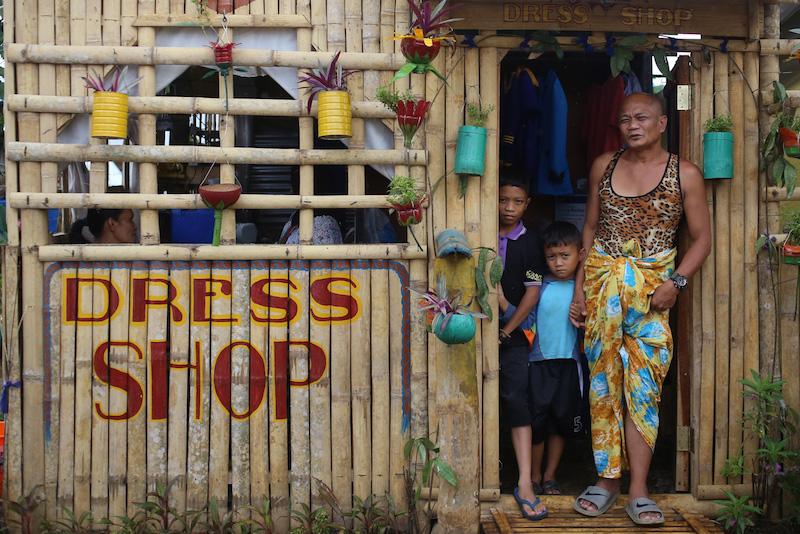 Tailor Gamor Dirindigun takes pride in building a home for his family. MANMAN DEJETO
Tailor Gamor Dirindigun takes pride in building a home for his family. MANMAN DEJETO
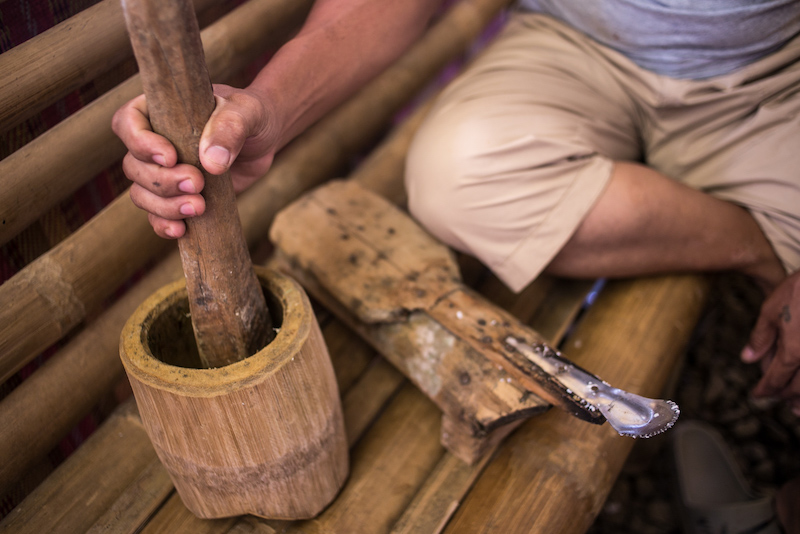 Gamor made a mortar and pestle and a coconut grater that so his family can cook dishes with coconut milk. He fashioned them from bamboo and other materials he gathered around the tent city. MANMAN DEJETO
Gamor made a mortar and pestle and a coconut grater that so his family can cook dishes with coconut milk. He fashioned them from bamboo and other materials he gathered around the tent city. MANMAN DEJETO
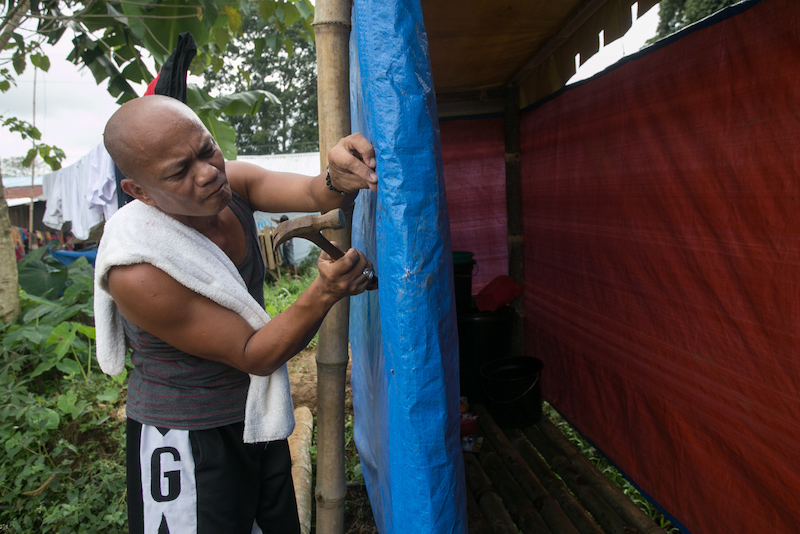 His home is a project-in-progress. Gamor works on sections of his house whenever he gets extra money for more building materials. MANMAN DEJETO
His home is a project-in-progress. Gamor works on sections of his house whenever he gets extra money for more building materials. MANMAN DEJETO
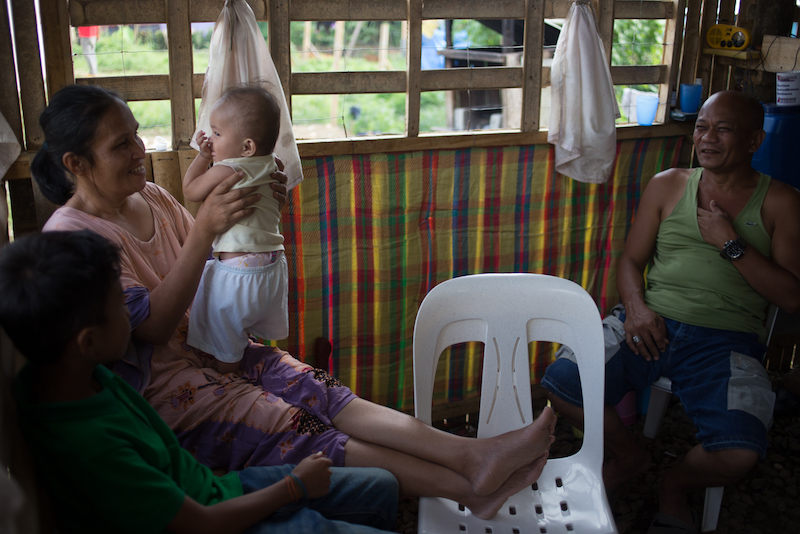 Gamor’s youngest child was just 2 months old when they left Marawi City on a tricycle. MANMAN DEJETO
Gamor’s youngest child was just 2 months old when they left Marawi City on a tricycle. MANMAN DEJETO
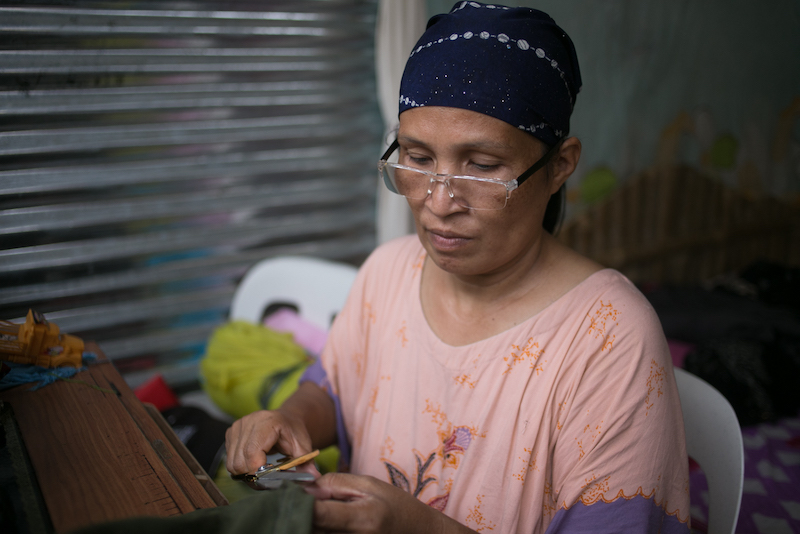 Ribisalam, Gamor’s wife, is a seamstress. MANMAN DEJETO
Ribisalam, Gamor’s wife, is a seamstress. MANMAN DEJETO
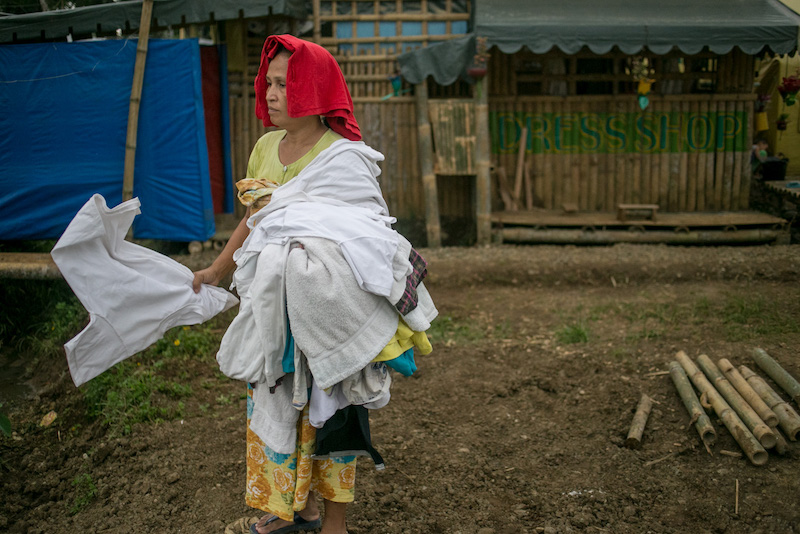 Ribi clearing the clothesline outside their home. MANMAN DEJETO
Ribi clearing the clothesline outside their home. MANMAN DEJETO
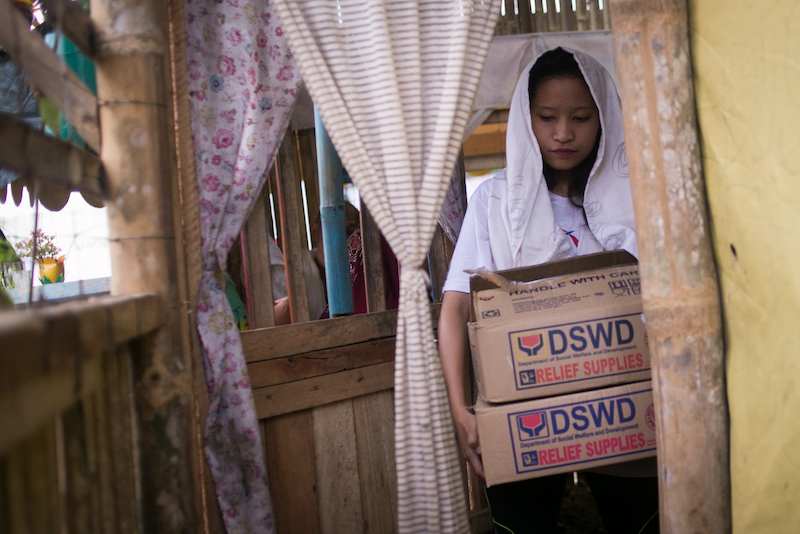 Gamor’s daughter carries aid packs. Tent city residents receive these aid packs thrice a month. MANMAN DEJETO
Gamor’s daughter carries aid packs. Tent city residents receive these aid packs thrice a month. MANMAN DEJETO
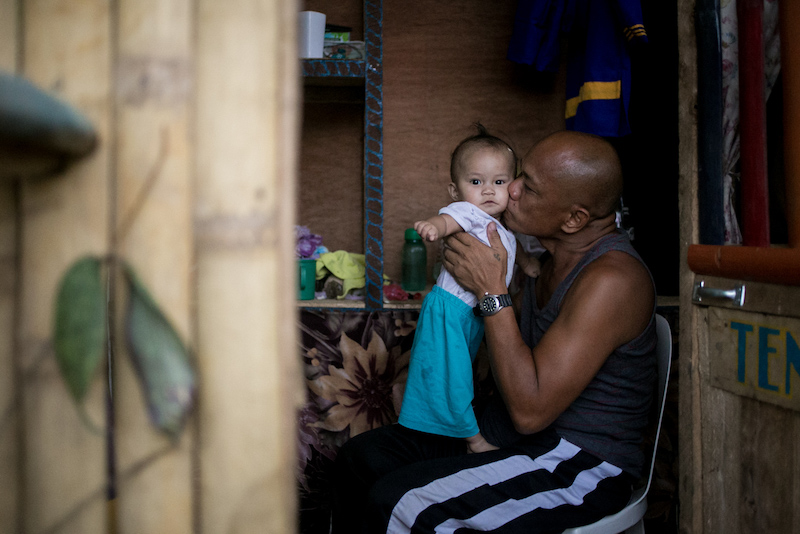 Gamor is a hands-on father. Here he is holding his youngest child. MANMAN DEJETO
Gamor is a hands-on father. Here he is holding his youngest child. MANMAN DEJETO
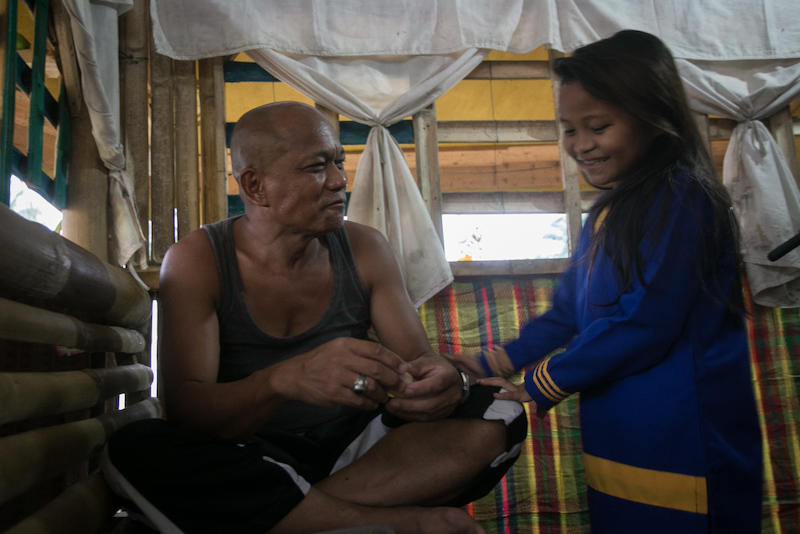 slideshow-MarawiTailor-Mindanews-9
slideshow-MarawiTailor-Mindanews-9
Gamor with one of his daughters. He made sure all his children get to continue attending school in Pantar town even if they are living in a temporary shelter. MANMAN DEJETO
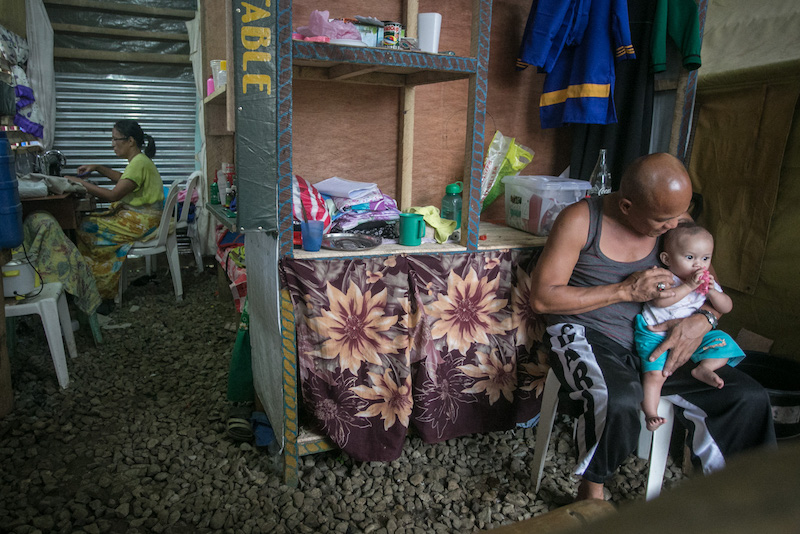 slideshow-MarawiTailor-Mindanews-10
slideshow-MarawiTailor-Mindanews-10
Everything in their home was built by Gamor. As a father, he wants his family to have a home to call their own. MANMAN DEJETO
With the end of the war came the talk to rebuild a devastated Marawi City. The national government tapped a known urban planner for his views on how to rebuild a heavily-destroyed city. But for Gamor, mending Marawi City has to start with its core foundation: its people.
He further adds that families have to have their dignity back if Marawi is to rise again. Parents should impart to their children how hard work and good values play a vital role in raising good individuals. The family after all is the basic fabric of any society.
Gamor makes a clear observation of Marawi City, his birthplace. “Ang pag-uugali dyan, ang sinusunod mo ang gusto mo, parang wala kang sinusunod na batas. Sarili mo lang. Isa yan sa mga dahilan (ng pagkasira ng Marawi).” (“The attitude there is that you follow only what you want, it is like you don’t follow the law but just your self. That is one reason…(for the destruction of Marawi).”
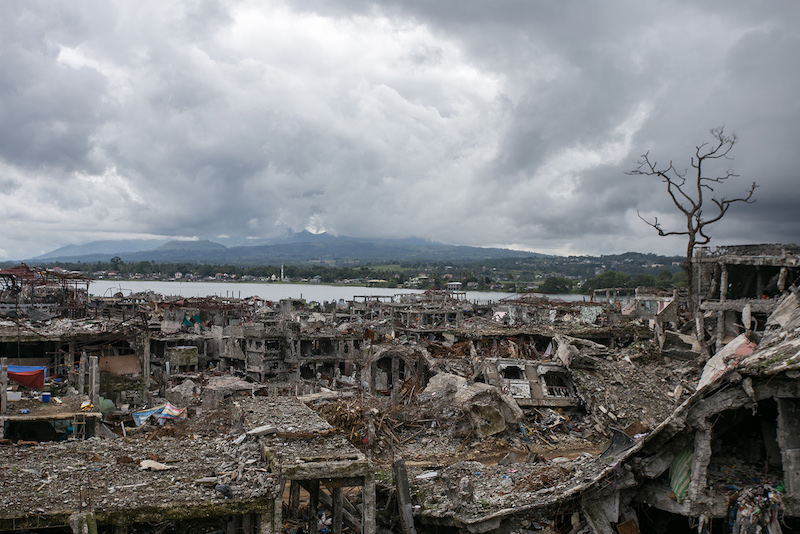 Remnants of a once thriving lake-side city. Home of the Maranao. MANMAN DEJETO
Remnants of a once thriving lake-side city. Home of the Maranao. MANMAN DEJETO
Marawi’s thriving shadow economy, its underworld coupled with poor governance made it easy for lawlessness and for terrorists to make it a lair. This was one of its downfalls that eventually caused pain and suffering for Marawi and its people.
Gamor, the tailor, couldn’t have said it any better. In life, he says, “Kailangan wala kang inaapakan. Sa akin, ang inaapakan ko lang itong apakan ng makina ko. “ (You should not step on the toes of others. For me, the only thing I step on to is the pedal of the sewing machine.)
[This piece was submitted by Manman Dejeto in November 2017 as his final project for the Diploma in Visual Journalism course at the Asian Center for Journalism at the Ateneo de Manila as a Fellow of the Konrad Adenauer Stiftung]
